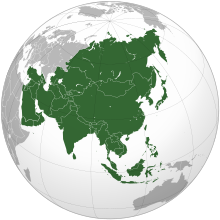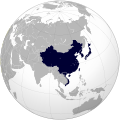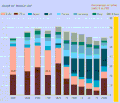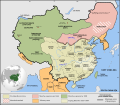
 Asia (/ˈeɪʒə/ AY-zhə, UK also /ˈeɪʃə/ AY-shə) is the largest continent in the world by both land area and population. It covers an area of more than 44 million square kilometres, about 30% of Earth's total land area and 8% of Earth's total surface area. The continent, which has long been home to the majority of the human population, was the site of many of the first civilisations. Its 4.7 billion people constitute roughly 60% of the world's population. Asia shares the landmass of Eurasia with Europe, and of Afro-Eurasia with both Europe and Africa. In general terms, it is bounded on the east by the Pacific Ocean, on the south by the Indian Ocean, and on the north by the Arctic Ocean. The border of Asia with Europe is a historical and cultural construct, as there is no clear physical and geographical separation between them. A commonly accepted division places Asia to the east of the Suez Canal separating it from Africa; and to the east of the Turkish straits, the Ural Mountains and Ural River, and to the south of the Caucasus Mountains and the Caspian and Black seas, separating it from Europe. Since the concept of Asia derives from the term for the eastern region from a European perspective, Asia is the remaining vast area of Eurasia minus Europe. Therefore, Asia is a region where various independent cultures coexist rather than sharing a single culture, and the boundary between Europe is somewhat arbitrary and has moved since its first conception in classical antiquity. The division of Eurasia into two continents reflects East–West cultural differences, some of which vary on a spectrum. (Full article...) Featured articleAngkor Wat (/ˌæŋkɔːr ˈwɒt/; Khmer: អង្គរវត្ត, "City/Capital of Temples") is a Hindu-Buddhist temple complex in Cambodia. Located on a site measuring 162.6 hectares (1,626,000 m2; 402 acres) within the ancient Khmer capital city of Angkor, it was originally constructed in 1150 CE as a Hindu temple dedicated to the deity Vishnu. It was later gradually transformed into a Buddhist temple towards the end of the century. Angkor Wat was built at the behest of the Khmer king Suryavarman II in the early 12th century in Yaśodharapura (present-day Angkor), the capital of the Khmer Empire, as his state temple and eventual mausoleum. Angkor Wat combines two basic plans of Khmer temple architecture: the temple-mountain and the later galleried temple. It is designed to represent Mount Meru, home of the devas in Hindu mythology and is surrounded by a moat more than 5 km (3.1 mi). Enclosed within an outer wall 3.6 kilometres (2.2 mi) long are three rectangular galleries, each raised above the next. At the centre of the temple stands a quincunx of towers. Unlike most Angkorian temples, Angkor Wat is oriented to the west with scholars divided as to the significance of this. (Full article...) Selected Country Cyprus (/ˈsaɪprəs/ ), officially the Republic of Cyprus, is an island country in the eastern Mediterranean Sea. It is geographically a part of West Asia, but its cultural ties and geopolitics are overwhelmingly Southeast European. Cyprus is the third largest and third-most populous island in the Mediterranean. It is located southeast of Greece, south of Turkey, west of Syria and Lebanon, northwest of Israel and north of Egypt. Its capital and largest city is Nicosia. Cyprus also shares land borders with Akrotiri and Dhekelia, a dependent territory of the United Kingdom. The northeast portion of the island is de facto governed by the self-declared Turkish Republic of Northern Cyprus. Cyprus was first settled by hunter-gatherers around 13,000 years ago, with farming settlements emerging a few thousand years later. During the late Bronze Age, Cyprus, known in contemporary sources as Alashiya, developed an urbanised society closely connected to the wider Mediterranean world. Cyprus experienced waves of settlement by Mycenaean Greeks at the end of the 2nd millennium BC. It was subsequently occupied by several major powers, including the empires of the Assyrians, Egyptians and Persians, from whom the island was seized in 333 BC by Alexander the Great. Subsequent rule by Ptolemaic Egypt, the Classical and Eastern Roman Empire, Arab caliphates for a short period, the French Lusignan dynasty and the Venetians was followed by over three centuries of Ottoman rule between 1571 and 1878 (de jure until 1914). Cyprus was placed under the United Kingdom's administration based on the Cyprus Convention in 1878 and was formally annexed by the UK in 1914. (Full article...) Featured biographyTōru Takemitsu (武満 徹, pronounced [takeꜜmitsɯ̥ toːɾɯ]; 8 October 1930 – 20 February 1996) was a Japanese composer and writer on aesthetics and music theory. Largely self-taught, Takemitsu was admired for the subtle manipulation of instrumental and orchestral timbre. He is known for combining elements of oriental and occidental philosophy and for fusing sound with silence and tradition with innovation. He composed several hundred independent works of music, scored more than ninety films and published twenty books. He was also a founding member of the Jikken Kōbō (Experimental Workshop) in Japan, a group of avant-garde artists who distanced themselves from academia and whose collaborative work is often regarded among the most influential of the 20th century. (Full article...) General imagesThe following are images from various Asia-related articles on Wikipedia. Featured picture Credit: Jean-Marie Hullot A farmer harvests seaweed growing on a rope, on the small island of Nusa Lembongan, Indonesia. Wooden posts demarcate the bay into rectangular plots that are owned by different families. Seaweed farming is a fairly simple process: Attached plants are placed in the sea and allowed to grow naturally, with little human intervention.
Did you know...
Updated: 6:33, 14 February 2024 In the news
Related portalsMajor Religions in Asia Middle East Central Asia and Caucasus Indian Subcontinent Southeast Asia East Asia Selected panorama
The Buriganga River flows past the southwest outskirts of Dhaka, the capital of Bangladesh. Its average depth is 7.6 metres (25 ft) and its maximum depth is 18 metres (58 ft). TopicsCategoriesAssociated WikimediaThe following Wikimedia Foundation sister projects provide more on this subject:
More portalsShortcuts to this page: Asia portal • P:ASIA Purge server cache |




























































































